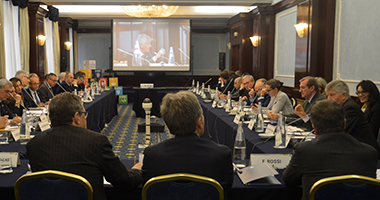The fourth edition of the Business & SDGs High Level Meeting, promoted by Global Compact Network Italy and organized with the support of Terna, was held on April 4 in Rome.
The meeting was attended by Managing Directors, Presidents and top managers of Italian companies involved in the United Nations Global Compact and daily committed to implementing the 10 UNGC Principles and achieving the SDGs. Among the participants: Aeroporti di Puglia, Assicurazioni Generali, BNP Paribas Cardif, Gruppo Sofidel, Gruppo Unipol, Rina, Viscolube, A2A, Carbonsink, Edison, Eni, Ferrovie dello Stato Italiane, Gruppo Hera, Leonardo, Maire Tecnimont, Pirelli, Saipem.
The meeting was further enriched by the contributions of top managers from non-business organizations engaged in sustainable development, such as ABI, FEEM - Eni Enrico Mattei Foundation, Social Venture Foundation, Sodalitas Foundation, Forum for Sustainable Finance, Italian Observatory for Sustainable Finance and a representative of the European Commission's Technical Expert Group on Sustainable Finance.
The meeting was an opportunity for high-level discussion and sharing on issues related to Finance supporting Sustainable Development, with particular focus on the importance of promoting sustainable and responsible investments - taking into account risk, performance and impact – aimed at supporting companies which are adopting a development-oriented business approach – by actively investing in it.
In his keynote speech, Christian STRACKE, Global Head of Credit Research at PIMCO, offered important insights for debate, highlighting the potential of the 2030 Agenda as a reference framework and as an element for communication between companies and investors working to have a concrete impact on the welfare of the communities.
The debate session confirmed the ongoing willingness and commitment on the part of financial groups and insurance companies to promote investments in sustainability – especially those aimed at creating value among reference communities – thus proving how these initiatives are considered as an opportunity also by the financial world.
Production companies stressed the importance of interacting with a more “far-sighted” financial spokesperson who may propose longer-term investments (over 7 years) in order to support implemented actions for sustainable development. This approach is essential to make the results of these initiatives clear and measurable in environmental, social and economic terms.
It is therefore necessary to build an open and transparent dialogue – also in terms of shared language – between companies and investors to bring these two communities closer, possibly accompanied by the intervention of the public sector as a regulator encouraging sustainable investments especially in some areas such as mobility and infrastructure.
Partnership working between companies (including competitors), investors and non-profit entities – which can be key players in the designing of concrete sustainability initiatives with objectives of social innovation, and in measuring results – is an essential factor for communities to achieve positive results and for companies and investors in terms of economic returns.

